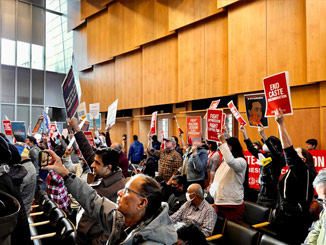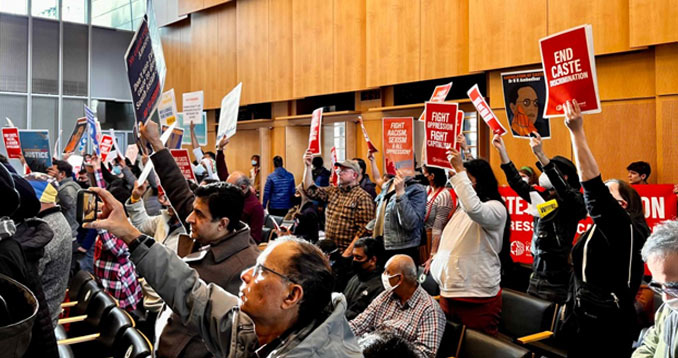

SAPAN NEW How does one get a front-row seat to witness history in the making? I think of the many minority-rights activists who have long been working for the rights of marginalised communities and wish they could have been alongside me, crying, laughing, hugging, chanting as we celebrated the passage of Seattle’s historic anti-caste discrimination law that now serves as a template for other cities. I write this essay for all my friends who work quietly and tirelessly for a just and equal world.
Hopping on the bus to Seattle Civic Center that cold morning, I was anxious and excited. I did not know what to expect. All I knew was I needed to be present at 2 pm, before the hearing began on 21 February 2023, to show my solidarity and witness the voting process of an ordinance that hopefully would pass to become law — an important and historic legislation that would finally give legal protection to those facing caste discrimination.
Entering the main doors of the Civic Center at street level, I was met with an eerie, unnerving calmness rather than the bustle I had expected. Instinctively, I took an elevator up to the lobby. That’s where the buzz was: Small groups in animated discussion, and a line of over a hundred people waiting to enter the chamber to cast their vote.
Standing at the front of the line, my friend Rita Meher, co-founder and executive director of Tasveer, gestured me over to introduce me to the community members with her. Many, I heard, had arrived at 2 am and had waited in bitter cold to ensure a spot to speak at the council. Being late, I took a poster and walked to the end of the line.
A white American woman ahead of me turned around and introduced herself as Susan. She wanted to know where I stood on the anti-caste discrimination law. I told her I was voting ‘yes’. She said she would vote ‘no’ because the law would hurt the sentiments of her friends in the Hindu community.
“How is it hurtful?” I asked.
“The word “caste” need not be mentioned,” she replied. “It’s a deliberate attempt to bring up issues of the past. It began with the British. In 1950, caste became outlawed.”
“Susan, the caste system did not begin with the British,” I replied. Yes, the British used it effectively to govern and for their advantage, I added. And yes, caste was officially abolished in 1950. That does not mean casteism does not exist. America prohibits discrimination based on race, but race discrimination still exists.
I come from a Brahmin background, I told her. I do not identify with it. One inherits the caste one is born into. When I visit India, I see firsthand how ‘lesser’ communities are treated, including some of my family members. They are not allowed to use the same utensils as us or to sit on a chair next to us and talk as equals. They sit on the floor. There are incidents of Dalits getting beaten to death for drinking water from a source not specifically designated to them. These are only a few examples.
Then I asked her if she believed in equality and human rights.
“Of course, I do!” She promptly replied.
“Then we are on the same page! It is about equality and human rights. Until everyone has the same starting point in life, a level playing field, it becomes everyone’s duty to support the marginalised.”
Susan took out her cell phone and showed me a document with information on this matter. I asked her the source of the information she was sharing with me, and she said she had received it from her Hindu friends; there was no mention of sources.
I gently suggested she read the work of historian Romila Thapar and listen to the podcast Empire by William Dalrymple and Anita Anand. Susan wrote down the suggestions.
I told her how much I appreciated her being receptive to hearing my side, that I would do the same for her, and that she could reach out to me anytime. She remained respectful throughout the time we conversed despite being on opposite sides. I wonder if she looked up the materials I suggested.
The line started moving. People were being let into the chamber in sets of ten at a time. When it was Susan’s turn, she graciously allowed me to go ahead of her. I think she could tell how much this meant to me.
In the already crowded chamber, many stood in the wings. Rita had saved a seat for me in the front row. The euphoria was contagious. People had their banners and cellphone cameras ready over hushed conversations. An occasional mediaperson scuttled from one end of the chamber to the other.
Those opposing the bill, albeit a minority, were more in numbers than I had thought. They were fervently vocalising their dismay at the ordinance. Some 300 attendees, both virtual and in-person, had signed up to speak and vote, with 45 seconds to comment. The session alternated between ten virtual speakers and ten in-person. Not all got a chance due to the time constraint.
Rita, the first speaker, introduced herself and added a deeply personal message conveying that she publicly came out as an Adivasi on 24 January 24 2023, the day the ordinance was proposed. She looked shaken as thunderous applause sounded. Dalit-rights activist and executive director of Equality Labs, Thenmozhi Soundararajan dashed across the aisle to embrace her in a poignant and uplifting moment.
There were powerful speakers from local Sikh and Muslim communities, besides a Tibetan, a couple from Nepal, and Dalits who courageously came out for the first time. Some were still afraid to use their last name lest they face an issue in their workplace.
The diverse crowd included members representing groups and organisations like the Indian American Muslim Council, Ambedkar King Study Circle, Tasveer, Equality Labs, Southasia Peace Action Network (Sapan), and local Hindu organisations. People had even flown in from California, Georgia, New York, and Vancouver, Canada. One person stood out for calling himself a “Proud Dalit” and voting against the ordinance.
After the public hearing, city officials made their comments. Six council members voted in favour of the ordinance, while the lone naysayer, Sara Nelson (democratic party), argued that there was not enough data or research to support the addition of caste to the existing anti-discrimination laws.
The chamber erupted in cheers and “Jai Bhim” slogans after the law passed 6-1, Jai Bhim being the slogan and greeting used by followers of Dr. BR Ambedkar, an Indian scholar, social reformer and the chief architect of the Constitution of India. There were tears of joy. People embraced each other at random.
Ecstatic supporters of the law headed downstairs to a celebratory party that included victory speeches by council member Kshama Sawant and other activists.
“There is a long and arduous struggle ahead,” said Sawant. “The movement has to grow.”
Thenmozhi Soundararajan, wearing a signature Ambedkar-blue suit, spoke forcefully and passionately to keep up the spirits in the room, “First Seattle, now the nation!”
Headed home that night, the recurring thought running through my head was that small steps, a few setbacks, and the persistence to move forward are what it takes to bring about positive social change.
Shailaja Rao is board president, Tasveer and founder-member, Southasia Peace Action Network, Sapan.

Leave a Reply